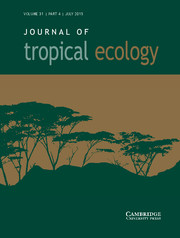Crossref Citations
This article has been cited by the following publications. This list is generated based on data provided by
Crossref.
Atkin, L.
and
Proctor, John
1988.
Invertebrates in the litter and soil on Volcán Barva, Costa Rica.
Journal of Tropical Ecology,
Vol. 4,
Issue. 3,
p.
307.
Lavelle, Patrick
and
Pashanasi, Beto
1989.
Soil macrofauna and land management in Peruvian Amazonia (Yurimaguas, Loreto).
Pedobiologia,
Vol. 33,
Issue. 5,
p.
283.
O'Dowd, Dennis J.
and
Lake, P. S.
1989.
Red crabs in rain forest, Christmas Island: removal and relocation of leaf-fall.
Journal of Tropical Ecology,
Vol. 5,
Issue. 3,
p.
337.
Dangerfield, J. Mark
1990.
Abundance, biomass and diversity of soil macrofauna in savanna woodland and associated managed habitats.
Pedobiologia,
Vol. 34,
Issue. 2,
p.
141.
Yeates, G. W.
1991.
Nematode populations at three forest sites in New Caledonia.
Journal of Tropical Ecology,
Vol. 7,
Issue. 3,
p.
411.
Fragoso, Carlos
and
Lavelle, Patrick
1992.
Earthworm communities of tropical rain forests.
Soil Biology and Biochemistry,
Vol. 24,
Issue. 12,
p.
1397.
Proctor, John
1992.
The Ecology of Areas with Serpentinized Rocks.
p.
249.
Stork, Nigel E.
and
Eggleton, Paul
1992.
Invertebrates as determinants and indicators of soil quality.
American Journal of Alternative Agriculture,
Vol. 7,
Issue. 1-2,
p.
38.
Olson, David M.
1994.
The distribution of leaf litter invertebrates along a Neotropical altitudinal gradient.
Journal of Tropical Ecology,
Vol. 10,
Issue. 2,
p.
129.
Thomas, Len
and
Proctor, John
1997.
Invertebrates in the litter and soil on the ultramafic Mount Giting-Giting, Philippines.
Journal of Tropical Ecology,
Vol. 13,
Issue. 1,
p.
125.
Dangerfield, J. M.
1997.
Abundance and diversity of soil macrofauna in northern Botswana.
Journal of Tropical Ecology,
Vol. 13,
Issue. 4,
p.
527.
Andrew, N. R.
Rodgerson, L.
and
Dunlop, M.
2003.
Variation in invertebrate–bryophyte community structure at different spatial scales along altitudinal gradients.
Journal of Biogeography,
Vol. 30,
Issue. 5,
p.
731.
Tsukamoto, Jiro
and
Sabang, John
2005.
Soil macro-fauna in an Acacia mangium plantation in comparison to that in a primary mixed dipterocarp forest in the lowlands of Sarawak, Malaysia.
Pedobiologia,
Vol. 49,
Issue. 1,
p.
69.
Robert, Orhue Ehi
Frank, Uzu Ogbonnaya
and
Agbonsalo, Osaigbovo Ulamen
2006.
Influence of Activities of Termites on Some Physical and Chemical Properties of Soils under Different Land Use Patterns: A Review.
International Journal of Soil Science,
Vol. 2,
Issue. 1,
p.
1.
Hasegawa, M.
Ito, M.T.
and
Kitayama, K.
2006.
Community structure of oribatid mites in relation to elevation and geology on the slope of Mount Kinabalu, Sabah, Malaysia.
European Journal of Soil Biology,
Vol. 42,
Issue. ,
p.
S191.
Almeida‐Neto, Mário
Machado, Glauco
Pinto‐da‐Rocha, Ricardo
and
Giaretta, Ariovaldo A.
2006.
Harvestman (Arachnida: Opiliones) species distribution along three Neotropical elevational gradients: an alternative rescue effect to explain Rapoport's rule?.
Journal of Biogeography,
Vol. 33,
Issue. 2,
p.
361.
Anichkin, A. E.
Belyaeva, N. V.
Dovgobrod, I. G.
Shveenkova, Yu. B.
and
Tiunov, A. V.
2007.
Soil microarthropods and macrofauna in monsoon tropical forests of Cat Tien and Bi Dup-Nui Ba National Parks, southern Vietnam.
Biology Bulletin,
Vol. 34,
Issue. 5,
p.
498.
Jones, David T.
Rahman, Homathevi
Bignell, David E.
and
Prasetyo, Anggoro H.
2010.
Forests on ultramafic-derived soils in Borneo have very depauperate termite assemblages.
Journal of Tropical Ecology,
Vol. 26,
Issue. 1,
p.
103.
Bruijnzeel, L.A.
Kappelle, M.
Mulligan, M.
and
Scatena, F.N.
2011.
Tropical Montane Cloud Forests.
p.
691.
Proud, Daniel N
Tibbetts, Jessica A
Moore, Michael K
and
Townsend, Victor R
2011.
Diversity of Neotropical Harvestmen (Arachnida: Opiliones) Inhabiting Logs and Palm Fronds in the Rain Forests of Trinidad.
Annals of the Entomological Society of America,
Vol. 104,
Issue. 2,
p.
241.


